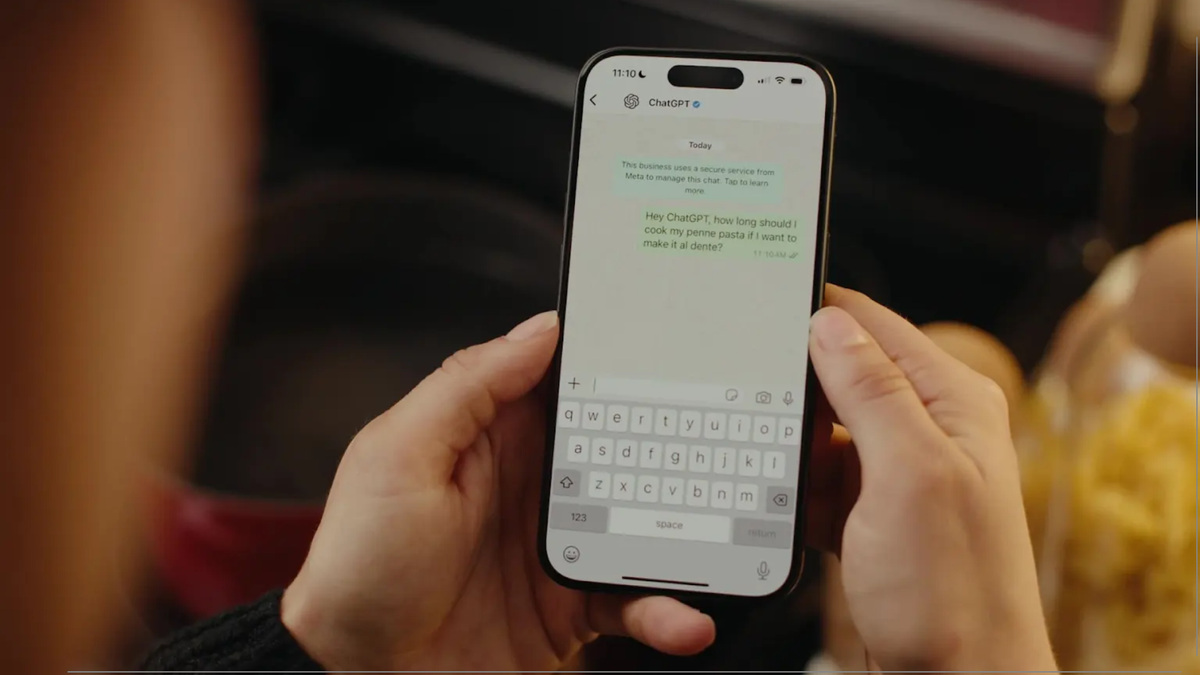ChatGPT on WhatsApp can now see, hear, and remember your conversations from elsewhere
Just snap a pic or send a voice note to 1-800-CHATGPT to get AI answers

OpenAI is upgrading the ChatGPT phone number you can text with on WhatsApp to be a lot more like the mobile app and web portal. From now on, you won't need to type out everything you want to say to the AI chatbot. Now, you can send a photo or record a voice memo that ChatGPT will "see" or "hear" and respond via the usual text form.
You'll be able to do things like take a picture of a foreign-language sign and ask for a translation or send an audio clip of your toddler’s latest philosophical ramblings and ask for a text transcription. It’s not quite as capable as the more standard portal, but it's very close. The phone number 1-800-CHATGPT still works, too, but by its nature as a phone call, it already takes audio input but can't accept images.
You've been able to use ChatGPT on WhatsApp since it debuted in December, but some may have been annoyed at having to fumble with the keyboard. Being able to snap a picture or send a quick voice note to get ChatGPT's help will be a real boon for them. Accepting voice messages and photos within an app that many people regularly use during the day makes it much easier for more spontaneous interactions, the way you'd randomly send a photo of voice recording to a friend when you think to do so.
For instance, imagine you’re out for a run and suddenly remember an idea you don’t want to forget. Instead of stopping to type it out, you can send a voice message to ChatGPT, asking it to summarize your thoughts into a note for later. Or let’s say you’re trying to fix something at home, and instead of awkwardly explaining the problem, you snap a picture and ask ChatGPT if it can offer troubleshooting tips.
ChatGPT remembers you
The update also introduces account linking. That means the AI will remember you and your previous preferences and interactions if you have a ChatGPT account through the app or web portal, whether at the free tier or with a subscription to ChatGPT Plus or Pro. Previous limitations, such as the 15-minute-a-month cap on AI calls, are being loosened. This update could entice those who like the idea of ChatGPT but have been reluctant to download the app or go to the website.
WhatsApp is one of the most widely used messaging platforms in the world, and adding more ChatGPT features there and removing the extra step of opening another app or switching contexts could be OpenAI's subtle pitch to WhatsApp users without ChatGPT accounts. Instead of needing to open ChatGPT separately, it’s now embedded in a place where they already spend time texting their family and friends. Why not an AI assistant, too?
OpenAI has mentioned that messages may be reviewed for safety purposes, so users should keep that in mind before sending anything too personal or sensitive. Still, for everyday tasks, creative brainstorming, and answering random questions on the fly, this update makes ChatGPT feel more integrated into everyday life than ever before.
Get daily insight, inspiration and deals in your inbox
Sign up for breaking news, reviews, opinion, top tech deals, and more.
Any upgrade that makes an AI chatbot feel like a natural, conversational tool within your favorite apps and less like a standalone tool with an app you only open when you need something specific is going to be of interest to OpenAI and its rivals.
Whether WhatsApp fans start reaching out to ChatGPT whenever a thought crosses their mind like “What’s for dinner?” or “Can you turn my 2 AM voice ramblings into something coherent?” remains to be seen.
You might also like

Eric Hal Schwartz is a freelance writer for TechRadar with more than 15 years of experience covering the intersection of the world and technology. For the last five years, he served as head writer for Voicebot.ai and was on the leading edge of reporting on generative AI and large language models. He's since become an expert on the products of generative AI models, such as OpenAI’s ChatGPT, Anthropic’s Claude, Google Gemini, and every other synthetic media tool. His experience runs the gamut of media, including print, digital, broadcast, and live events. Now, he's continuing to tell the stories people want and need to hear about the rapidly evolving AI space and its impact on their lives. Eric is based in New York City.
You must confirm your public display name before commenting
Please logout and then login again, you will then be prompted to enter your display name.
Most Popular




